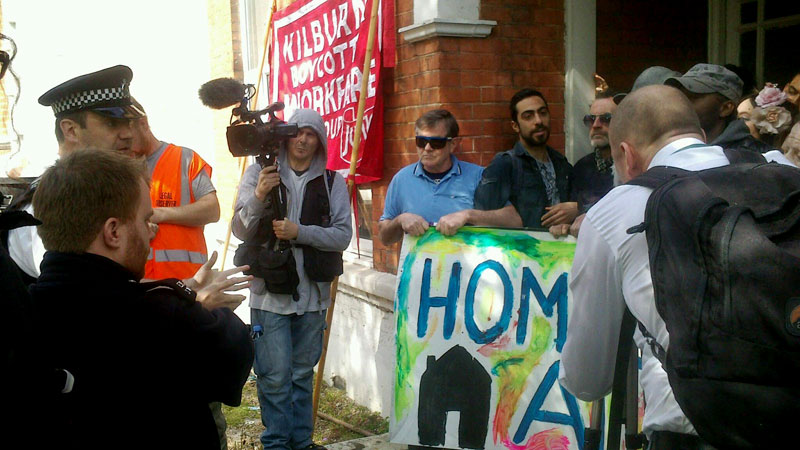
The campaign to prevent the eviction of a pregnant mother and her 12-year-old child from their home in Bravington Road, Maida Vale began on 21 March 2014.
To local campaigners in the Kilburn Unemployed Workers Group (KUWG) this had echoes of the 1980s social cleansing programme of council leader Lady Porter, the heiress to the Tesco empire, designed to rid certain areas in Westminster, including Maida Vale, of working class people, homeless people and anyone likely to vote against the majority Conservative Party.
KUWG organised to oppose this eviction. We noticed that the warrant issued by the courts was defective and that we therefore had a good case to stop the eviction so that the courts could be asked to examine the facts.
On the first morning on which the eviction was scheduled, the bailiffs turned up accompanied by three police officers, a housing officer from City West Homes, removal vans, builders and a security contractor. They were met by a demonstration in full flow.
The police immediately entered negotiations with the 30 or so campaigners, concluding after several rounds of ‘talks’ that the risk to personal safety was too great for the eviction to proceed. The assembled cops, bailiffs etc then beat a welcome retreat.
The following week a further attempt at the eviction of the same family was also halted by protesters, despite the police having a much reinforced presence.
So it was with confidence that KUWG volunteers arrived at 1 Lymington Road, West Hampstead on 10 April where Mark was scheduled to be evicted at High Noon. Mark is a very vulnerable person and KUWG members were deeply worried that he had not been properly assessed by persons qualified to do so. We believe that the kind of severe depression Mark suffers from can completely disempower a sufferer to the extent that the only remaining option becomes sleeping on the street (as many vulnerable people do).
Mark’s landlord had employed the type of tactics commonly used by slum landlords. This process involved, among other things, the sub-division of flats into smaller and smaller rooms, not much bigger than prison cells. Camden Council environmental health officers had condemned the property at 1 Lymington Road as seriously overcrowded and Camden Council had issued a prohibition order under the 2004 Housing Act to prevent the letting of rooms that are less than 70 square feet. This meant that the landlord had to stop renting the rooms until they were made safe, partitions had been removed and two rooms had been made into a single habitable room. As Mark’s room was adjacent to the unlettable small rooms, instead of moving existing tenants around within the property to facilitate the prescribed building works, or offering him suitable alternative accommodation, the landlord instead went to court to get an eviction order.
This left Mark depressed and powerless, to the point where he became completely overwhelmed by the situation. Furthermore, Camden Council did not seem to have taken the necessary measures to ensure he would have a home to go to following the imminent eviction.
10 April 2014 was a calm and warm morning. Campaigners assembled at 1 Lymington Road, confident that we could rely on the coroner’s insistence at the inquest into the death of Nygell Firminger* that statutory bodies must liaise carefully to avoid evicting vulnerable persons from their homes. We believed that Camden Council had not discharged its duties in this regard and that we could ensure that the police checked this before helping the landlord to evict a tenant who had done nothing wrong, had paid his rent up to date and was being evicted solely for the financial gain and convenience of the landlord.
However, on this occasion the police were not in the mood for dialogue and refused to make a phone call to the Chief Executive of Camden Council as requested by the campaigners, who repeated that the council has a duty of care to ensure that the vulnerable person had a suitable home to go to before being evicted.
The police told the protesters that the eviction warrant had been granted eight months previously, but refused to let campaigners see the document, saying that the bailiff who was with them had it in his possession. A press photographer was refused permission to photograph the warrant.
The police had not come prepared to talk, or consult or listen to the genuine concerns about the coroner’s ruling at the Nygell Firminger inquest. Instead, they returned to their vehicles and donned combat gear, then headed back to 1 Lymington Road in almost military formation, insisting the eviction was going to take place no matter what.
The protesters were now standing in front of the door with arms linked. Five police officers went straight up to me, as I was the one calling the loudest for them to phone the Camden Chief Executive. They demanded that I leave or be arrested. I was knocked unconscious for five to ten minutes, and when I recovered was arrested and taken to Kentish Town Police Station. A further 13 demonstrators were then arrested. After eight hours detention I was charged with resisting or obstructing an enforcement officer or person engaged to execute a High Court writ contrary to the Criminal Law Act 1997. Everyone else was released without charge. Mark was driven in a police car to the Camden Council Housing Office and left at the door to try and explain his situation over a public internal phone.
I was granted bail to appear at Highbury Magistrates Court, 51-53 Holloway Road, N7 8JA on 16 May 2014 at 09:30 am. KUWG is calling on activists to demonstrate at the court, in solidarity with the struggle against evictions.
John Tymon, Kilburn Unemployed Workers Group
kilburnunemployed.blogspot.co.uk
www.revolutionarycommunist.org/index.php/britain/3084-nf120713




